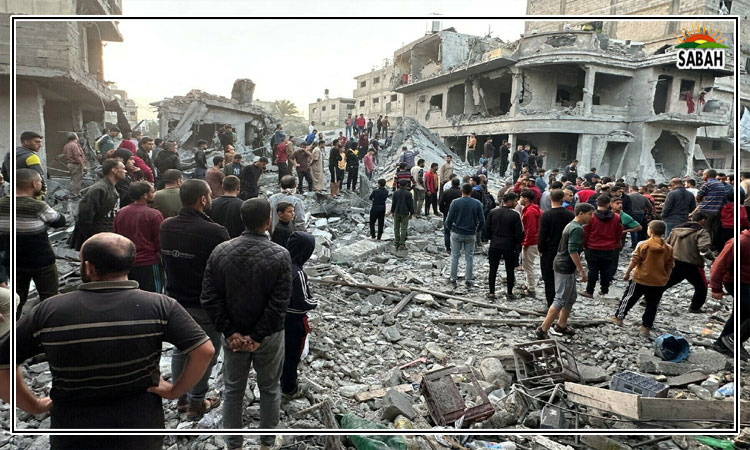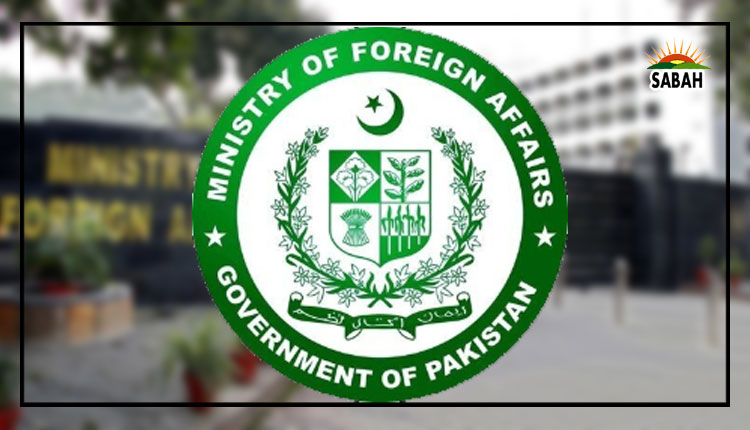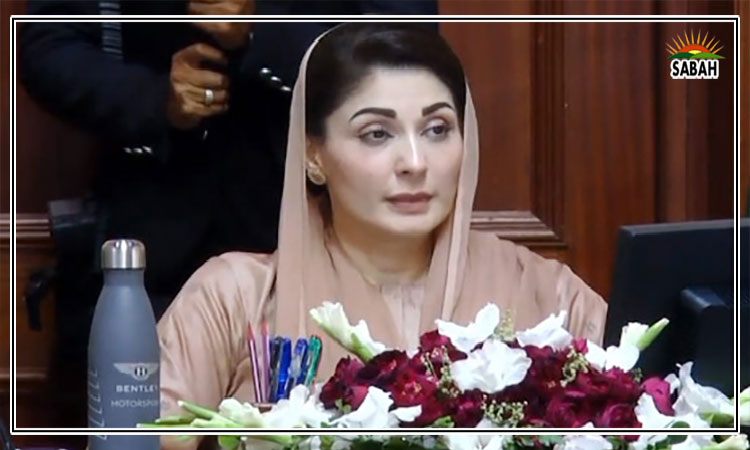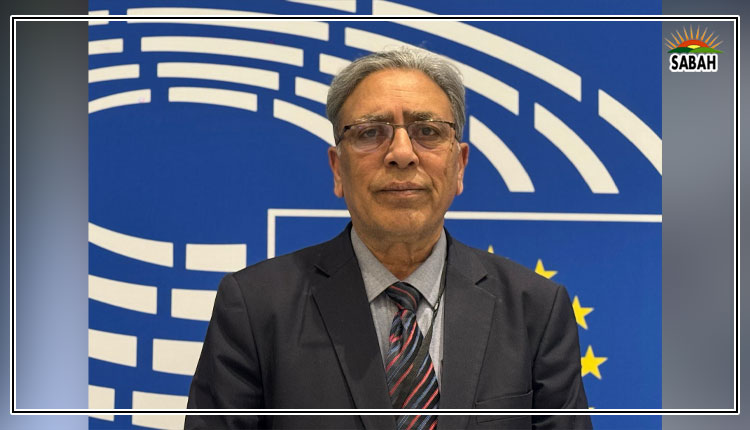Iran’s Islamic Revolution played an important role in the evolution of the int’l system: Nabi Shiraziv
ISLAMABAD, June 02 (SABAH): Nabi Shiraziv, Charge d’affaires of the Embassy of the Islamic Republic of Iran in Pakistan has said that Iran’s Islamic Revolution played an important role in the evolution of the international system.
This was stated by Nabi Shiraziv while addressing on the occasion of the 34th anniversary of the demise of Imam Khomeini (RA) here on Friday. Nabi Shiraziv said that we are present on the eve of the 34th anniversary of the demise of the late founder of the Islamic Republic of Iran, Imam Khomeini (R.A). He said that the outstanding personality of this Islamic scholar and a great man of history has always been a source of inspiration for the lovers of freedom all over the world, and the great achievements of his life are long lasting. Nabi Shiraziv said that the starting point of Imam Khomeini’s movement is the negation of the then order established in the international arena based on materialism, hegemony, power, imperialism, colonialism and capitalism on the one hand, and the efforts to revive the religious values of pure Islam on the other hand.
Nabi Shiraziv said that Iran’s Islamic Revolution played an important role in the evolution of the international system. “In this way, the theoretical and practical thought of Imam Khomeini (RA) had a tremendous impact on the formation of the new order in the contemporary world” he said.
Nabi Shiraziv said that the Islamic Revolution of Iran and the late Imam Khomeini (RA) showed that material power and capitalism are not the only constituents in the world and proved that it is the faith on God, reliance on God and people’s will and power that can play a decisive role in the international system.
He said that during the past four decades, Iran has faced many challenges, including imposed war, economic sanctions, economic war, and various types of terrorism, including economic terrorism, military terrorism, environmental terrorism, and medical terrorism, but despite all these pressures, it succeeded and stood resilient. He said that the foundation of this resistance and resilience was built by the resistance and self-reliant movement which was defined on the basis of Islamic teachings by Imam Khomeini (RA). He said that despite all the conspiracies and hostile actions against Iran, the people of Iran have been able to succeed due to the spirit of self-belief and self-reliance that has come to the fore through the thoughts of Imam Khomeini.
Nabi Shiraziv said that one of the important impacts of Imam Khomeini’s thought was the emphasis on the unity of Muslims and proximity among them, which arises from the religious belief, the holy Quran and the teachings of the great Prophet of Islam (PBUH). Unity and integration are needed today in the Islamic world, he said. In this regard, we should all strive to strengthen unity in line with other issues of the Islamic world, including Islamophobia. In this framework, following Imam Khomeini’s thoughts and approach in shaping the unity diplomacy, is the need of time for the Muslims to confront common threats. The threats that may bring brother against brothers and will not serve any purpose other than increasing the sufferings of the people and weakening the Islamic world, he said.
Nabi Shiraziv said that Imam Khomeini (RA) believed that unity and proximity among the Islamic sects are possible, necessary and inevitable. He did not look at the issue of unity and solidarity as a temporary and transitory tactical matter, rather, he emphasized on the issue of unity as a permanent and sustainable strategy to strengthen the whole Islamic world. Because, by unity in the Islamic world, it will guarantee peaceful coexistence and symbiosis among the Muslims in all parts of the world, increase more tolerance and will contribute to the growth, development, prosperity and strength of the whole Islamic world, he said.
Nabi Shiraziv said that undoubtedly, the enemies of unity in the Islamic world have made many efforts to create division and separation, but by the grace of God and the vigilance and pragmatism of the leaders of the Islamic countries, these conspiracies have now been neutralized. The world is now on the verge of a great change and moves towards a new order; founded by the initiative of the two brotherly countries of Iran and Saudi Arabia at the regional level, he said.
Nabi Shiraziv said that Hazrat Imam (R.A.) highly emphasizes the unity of Muslims and the issue of solidarity in the Islamic world. This concept is based on the religious beliefs and teachings of the Holy Qur’an and the Sunnah of the Holy Prophet (PBUH). At the same time, Hazrat Imam actively played his role and invited the scholars of other Muslim countries to this subject. His initiative in introducing the unity week today has created an almost unique capacity to create maximum cooperation, coexistence, and friendship in the Islamic world.
He said that another impact of Imam Khomeini’s thought on the new order of the contemporary world was the introduction of the last Friday of the holy month of Ramadan as the International Quds Day. This day is another manifestation of unity and integration in the Islamic world on the common cause of the freedom of Palestine and Alquds as the first Qibla of Muslims. The issue of Palestine was one of the clear symbols of Imam Khomeini’s (RA) practical action in the field of creating unity and strengthening unity. The issue of Palestine is and will be an undeniable fact of the Islamic world. Imam Khomeini R.A. called for the support of the people of Palestine and negating the terrorist and apartheid Zionist regime and liberation of the entire land of Palestine.
Nabi Shiraziv said that based on the thoughts of Imam Khomeini, the noble concept of unity diplomacy has evolved today. Some of the main axes of unity diplomacy include the religious commonalities between Shiites and Sunnis, which include the belief in the God Almighty, the Holy Quran, the holy and pure existence of the Prophet (PBUH) and the unique Qiblah. The second axis is the common interests of the Islamic Ummah. The third pillar of the unity diplomacy is the common threats that Muslims are facing, and they must have maximum tolerance and interaction with each other in order to resolve these threats, he said.
“Of course, unity diplomacy should be pursued seriously not only by diplomats and political officials but also by scholars of the Islamic schools of thought and Muslims. If the diplomacy of unity continues, a power will emerge from the unity of Muslims and Islamic states, which not only will no more need the arrogant powers of the world, rather these world powers will need them” he said.
Nabi Shiraziv said that in the new international order, benefiting from the capacities of unity and integration should be focused on confronting Islamophobia that Muslims are facing now. Burning the holy Quran, desecrating the personality of the Holy Prophet (PBUH) is a common threat that all Muslims have a common duty to deal with.
Based on the teachings of the Qur’an, Imam Khomeini firmly believed in rejecting domination and subjugation, and in this regard, establishing a fair and friendly relationship based on mutual respect with the countries of the world was priority number one,
Moreover, Imam reiterated establishing friendly and fraternal relations with all the countries of the Islamic world, he said.
Nabi Shiraziv said that the fraternal and friendly relations based on mutual respect and respect for territorial integrity of the two neighbouring countries have been witnessed in ties between Iran and Pakistan during years after the revolution. Dynamic relations, with upward and onward trajectory, based upon religious, historical, ethnic, cultural, and linguistic commonalities, evolved in the framework of good neighborliness and mutual respect, he said.











